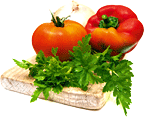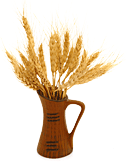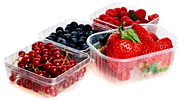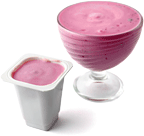Top 10 Whole Foods for Health
By Sara Tiner
Nutritionally, there is no perfect food, although a few come pretty close. And even if there were, who'd want to eat the same thing every meal, every day? Fortunately, variety and healthy eating can go hand in hand, particularly if you know where to look. Here's a Top 10 list of foods that pack a nutritional punch and can be incorporated into a wide variety of meal plans.
1. Anything Fresh
 With the fast pace of life today, it's hard to make time for fresh food. Why should you? Because food that's fresh, especially if it's locally grown, is often the healthiest diet choice out there. Fresh food contains a complete array of nutrients, which is just not available in many processed foods. Even in winter we can find root vegetables, apples and pumpkins.
With the fast pace of life today, it's hard to make time for fresh food. Why should you? Because food that's fresh, especially if it's locally grown, is often the healthiest diet choice out there. Fresh food contains a complete array of nutrients, which is just not available in many processed foods. Even in winter we can find root vegetables, apples and pumpkins.
2. Beets
 Here's an interesting fact: Beets were one of the most successful crops in the Biosphere project. Don't remember the Biosphere project? Basically, it simulated living on the moon. And if you had to pick one vegetable to take with you to the moon, you'd do well to pick beets. The roots and leaves are packed with antioxidant phytochemicals, provide much-needed minerals and vitamins, and are a good source of fiber.
Here's an interesting fact: Beets were one of the most successful crops in the Biosphere project. Don't remember the Biosphere project? Basically, it simulated living on the moon. And if you had to pick one vegetable to take with you to the moon, you'd do well to pick beets. The roots and leaves are packed with antioxidant phytochemicals, provide much-needed minerals and vitamins, and are a good source of fiber.
 3. Rye
3. Rye
Obesity statistics suggest a good portion of us could use some help battling the scale, and rye is on your side. Rye has an excellent reputation for helping us feel full, produces a low insulin response, and is typically a good source of fiber. It is a rich source of minerals, too. But watch out! "Rye" breads can be a mix of different flour sources, so make sure whatever brand you get consists of whole grains in general, and rye in particular. And don't forget - there are other ways to enjoy rye, like as a hot cereal (or porridge). One small study found that people who ate rye porridge for breakfast ate 16 percent less at lunch than those who ate white bread toast.
4. Organic Berries
 This isn't a hard sell, right? Juicy, bright, and tasty, berries add fiber, vitamins and antioxidants to your diet. These little gems appear to support healthy arteries, cognition, inflammation and eyesight. Many studies have found a benefit in drinking cranberry or blueberry juice for prevention of urinary tract infections. But watch out for juice - sugary drinks aren't on anyone's top 10 lists! Eat the berries alone, in your cereal, or in a smoothie for the most benefit. And get organic berries when you can; when you can't, rinse your berries well. Even frozen, they can retain pesticide residue, and that's not good for anyone.
This isn't a hard sell, right? Juicy, bright, and tasty, berries add fiber, vitamins and antioxidants to your diet. These little gems appear to support healthy arteries, cognition, inflammation and eyesight. Many studies have found a benefit in drinking cranberry or blueberry juice for prevention of urinary tract infections. But watch out for juice - sugary drinks aren't on anyone's top 10 lists! Eat the berries alone, in your cereal, or in a smoothie for the most benefit. And get organic berries when you can; when you can't, rinse your berries well. Even frozen, they can retain pesticide residue, and that's not good for anyone.
5. Fermented foods
 Face it Mr. Clean, the human body needs bacteria, and fermented foods provide "good" bacteria (probiotics) to give our native colonies a helping hand. Fermentation means that probiotics (like Lactobacillus and Bifidobacterium) are added to foods (including miso, yogurt and sauerkraut), and the food is changed as the bacteria process it. Clinical trials continue to examine the benefits of probiotics on gastrointestinal complaints like diarrhea and irritable bowel syndrome, as well as for conditions such as colic and eczema in infants.
Face it Mr. Clean, the human body needs bacteria, and fermented foods provide "good" bacteria (probiotics) to give our native colonies a helping hand. Fermentation means that probiotics (like Lactobacillus and Bifidobacterium) are added to foods (including miso, yogurt and sauerkraut), and the food is changed as the bacteria process it. Clinical trials continue to examine the benefits of probiotics on gastrointestinal complaints like diarrhea and irritable bowel syndrome, as well as for conditions such as colic and eczema in infants.

